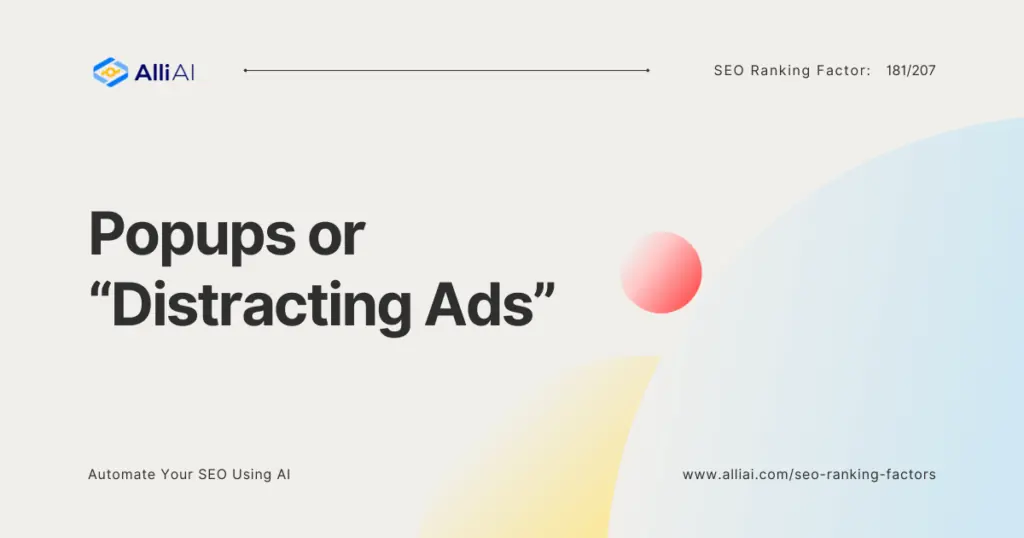Understanding Popups or “Distracting Ads” as a Ranking Factor
Popups, often referred to in SEO contexts as “Distracting Ads,” refer to those intrusive advertisements or dialog boxes that appear over the webpage content, often without clear or easy means for users to close them. Imagine walking through a crowded market, and suddenly someone steps right in front of you, blocking your way and insisting you listen to them. This analogy parallels how popups can disrupt the user’s online journey, obstructing their access to the content they came for.
Why is the Consideration of Popups Vital in SEO?
The importance of addressing popups in search engine optimization (SEO) cannot be overstated. Search engines like Google prioritize providing their users with quality search results. This means directing users to websites that offer not only relevant content but also a positive user experience. Intrusive popups detract from this experience, potentially leading to higher bounce rates and lower engagement metrics—signals to search engines that a website might not be valuable or user-friendly.
The Impact of Popups on SEO Performance
Popups can significantly affect a website’s SEO in various ways, primarily through user experience metrics. One notable statistic from a Google Page Experience update suggests that websites with non-intrusive popups or without popups tend to perform better in search rankings than those with intrusive popups. This aligns with Google’s increased emphasis on user experience signals, including mobile-friendliness, safe browsing, HTTPS, and no intrusive interstitials.
For further illustration, consider research conducted by the Nielsen Norman Group, which outlines that any element—including popups—that significantly interrupts user flow can decrease usability by approximately 37%. This, in turn, impacts the site’s desirability in search engine algorithms.
FAQ
Can all popups negatively affect SEO?
Not necessarily. Google distinguishes between popups that are essential for legal reasons (like age verification or cookie usage notifications) and those purely designed for marketing or disruption. It’s the latter that can harm your SEO. Properly configured popups, especially those triggered by user actions or displayed after a significant interaction time, may have minimal negative impact.
Are there best practices for using popups without hurting SEO?
Yes, several strategies can mitigate potential negative impacts. Use popups responsibly by ensuring they are easy to dismiss, don’t cover essential content, and preferably, are triggered by user interactions. Also, consider implementing popups after a delay or when users are about to leave the site, known as exit-intent popups.
How does Google detect and evaluate popups?
Google’s algorithms are sophisticated and designed to simulate real user experiences. This includes how content is accessed and interacted with on a webpage. If a popup significantly detracts from the ability to access content easily and quickly, it’s likely to be flagged by Google’s web crawlers as being intrusive, which can then affect the site’s search rankings.
Conclusion
Popups—specifically those classified as “Distracting Ads”—serve as a significant ranking factor in SEO due to their impact on user experience. Websites aiming for top search engine rankings must carefully evaluate how, when, and where they use popups. While not all popups are detrimental, their misuse or overuse can lead to negative feedback signals to search engines, thereby affecting website visibility and traffic. By adhering to best practices and prioritizing user experience, websites can effectively navigate the challenges popups may present to SEO efforts.






